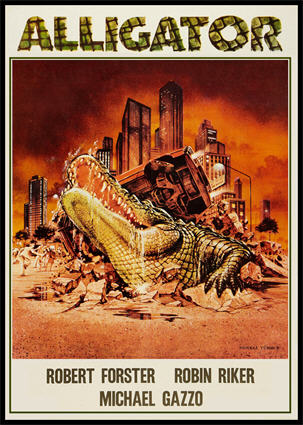
“He was out on medication most of the time that he was here… He kept coming up with some garbage about alligators in the sewers.”
Director: Lewis Teague
Starring: Robert Forster, Robin Riker, Michael Gazzo, Dean Jagger, Henry Silva, Bart Braverman, James Ingersoll, Jack Carter, Sydney Lassick, Buckley Norris, Perry Lang
Screenplay: John Sayles, based upon a story by John Sayles and Frank Ray Perilli
Synopsis: At an alligator park in Florida, a young girl watches more fascinated than horrified as a keeper is attacked by one of the animals; afterwards, she persuades her parents to let her buy a baby alligator to keep as a pet. She does not have the tiny reptile long, however: while she is at school, her irate father flushes it down the toilet… Twelve years later, Detective David Madison (Robert Forster) is called to a sewage treatment plant when a severed arm is found in one of the filters. Maddison notes that it looks like it has been chewed off. The medical examiner (Buckley Norris) tells him that a dead dog was also found, and that its likely owner has been contacted. However, the woman insists it cannot be her missing Lhasa Apso: although its markings look right, this animal is more than twice the size of her own dog. Pet shop owner Luke Gutchel (Sydney Lassick) has a lucrative sideline in the supply of dogs to Slade Pharmaceutical, where they are used for experimentation. He is getting cold feet over the operation, but his contact, Arthur Helms (James Ingersoll) insists that he needs more and more dogs – puppies – for test subjects. Gutchel is also given the job of disposing of the numerous dead dogs, which he throws into the sewers. This time, however, one of the animals falls onto a shelf beside the main stream. Worried that it may be found and the illegal operation exposed, Gutchel climbs down to push it into the water, only to notice that none of this crop of bodies are moving away. As he works them into the moving water, something looms up behind him out of the darkness… This time, the sewer workers find only a leg; it does not come from the same person as the arm. Madison’s investigation leads him to Slade Pharmaceutical, where a wary Helms confirms that he does use dogs in his experiments, but insists that they are obtained, used and disposed of according to protocol. Madison questions Helms about his research into experimental hormones, but finds himself stonewalled. As soon as Madison has gone, Helms confesses everything to the head of the company. Assured that no connection can be made between them and Gutchel, Slade (Dean Jagger) is unconcerned by his researcher’s illegal activities, sending him back to work with a promise that he will take care of everything. Meanwhile, a reluctant Madison fronts a press conference about the two apparently linked deaths, which he abruptly terminates when one of the reporters, Kemp (Bart Braverman), brings up the death of his former partner. Calling for a volunteer to help him search the sewers, Madison finds himself working with a cocky young patrolman named Kelly (Perry Lang). The two wander through a network of inadequately mapped tunnels, eventually locating a discarded lantern which is still alight, suggesting that someone else has been down there very recently. Agreeing that they need a search crew, and glad to call it a day, the two men head for an exit—only to find themselves face-to-face with an enormous alligator. After a desperate sprint they locate a ladder up to a manhole, but Madison cannot force it open in time, and can only watch helplessly as the screaming Kelly is dragged away into the darkness…
Comments: It’s a pretty sad indictment of the crocodilian branch of the killer animal movie that the best example of this particular subgenre is also a parody of it.
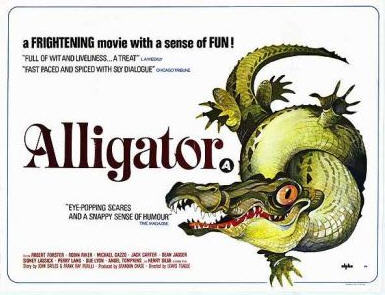
Historically, crocodiles and alligators have not been particularly well-treated by film-makers. For decades they languished in small supporting roles which, even allowing for a spectacular alligator-pit scene – or two – hardly even began to tap their potential; and when they were eventually promoted into starring roles, well, the results weren’t always pretty. I’ll grant you that several recent films have done a much better job in this respect – in fact, I’d nominate 2007’s Rogue as the second-best crocodilian movie – but for the best of the bunch we have to go back to 1980, to Lewis Teague’s Alligator.
I guess it isn’t entirely accurate to call Alligator “a parody”. Rather, what we have here is an old-fashioned monster movie, made by people who clearly love monster movies, but who are simultaneously fully aware of the absurdities of the genre. This acute awareness allows Lewis Teague and John Sayles, who wrote the screenplay, to navigate that notoriously narrow path between horror and humour, infusing their film with a thread of wicked black comedy that tends to leave the viewer groaning and laughing at the same time. Alligator could easily have been nothing more than a compendium of clichés – oh, hell, it is a compendium of clichés, from the cop whose partners keep dying, to SCIENCE!! as the Bad Guy, to the monster that somehow knows exactly who was responsible for its creation – but such is the sureness of touch behind the camera that instead it comes across as an affectionate tribute to the classic monster movies of the fifties – albeit one high on bloodshed and body parts – with the threatened elbow in the ribs held steadily in check and reduced to a mere flicker of the eyelid.
Alligator opens at a ’gator park in Florida, where a ’gator wrestler gets the worst of it in front of an audience not sure if this is part of the show or not, while the M.C. makes desperately cheerful small-talk (“Hey, sometimes the ’gators win!”). Among the crowd are a girl in her early teens and her parents, the latter of whom, much to their dismay, are unable to dissuade their daughter from a purchase of a baby alligator. As her mother clucks unavailingly, the ’gator salesman, recognising that he has a sucker on the hook, urges the girl unctuously to, “Pick yourself out a cute one, honey!”
And she does. “I’ll call him Ramon!” the girl announces, as the camera zooms in upon just the most adorable itty-witty little baby ’gator, awwww…
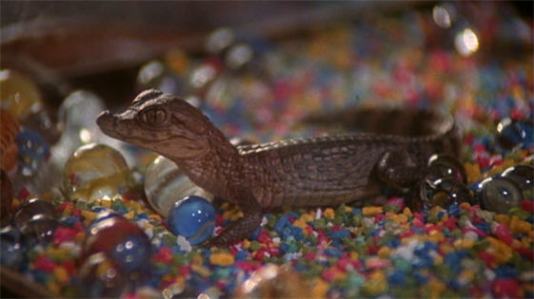 SQUEE!!!!
SQUEE!!!!
’Hem. Sorry.
(It should be pointed out that the hatchlings in this film are actually baby caimans. Whether they were more readily available, or whether someone realised that with their big eyes and snub snouts, they are even more adorable than baby ‘gators, isn’t clear.)
Back home in the ’burbs, Ramon begins a new life in an aquarium which, alas, he will not enjoy for long…
(Radio news coverage of the 1968 Democratic Convention, intended to date this sequence, is often misinterpreted to mean that Alligator is set in Chicago, but it is clearly set in Missouri, although not in St Louis. [Missouri State University has an active herpetology program, I believe, which would place us in Springfield; what, me overthink it?] Whatever was intended, we will shortly be provided with incontrovertible evidence that this film was shot in Los Angeles.)
While Ramon’s owner is at her science fair, her infuriated father finds reptile poop where it shouldn’t be and decides that enough is enough. Shrugging off his wife’s remonstrances, he scoops the tiny ’gator out of his tank, carries him upstairs to the bathroom, and tosses him into the toilet.
Father: “We’ll tell her we found it dead, like we did with the hamsters!”
(Great use of toilet-cam here, by the way.)
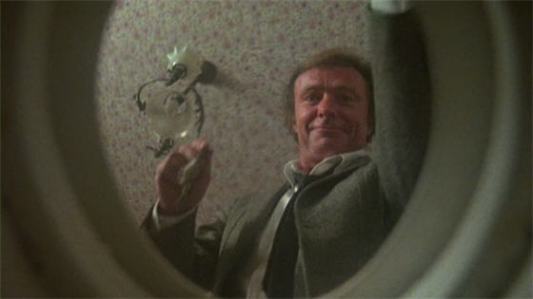 And yet, he’s allowed to die off-camera.
And yet, he’s allowed to die off-camera.
Twelve years later, Detective David Madison visits a pet-store to buy a puppy, to replace the dog that was stolen from outside a shop, where it had been left tied up for only a matter of minutes. This is not, we learn, an uncommon event in this neighbourhood.
(This scene also kicks off a running joke about Madison’s receding hairline. Curiously, given his on-record touchiness about his subsequent hair-plugs, this seems to have been Robert Forster’s own suggestion.)
Madison is called out to the local sewage treatment works, where he inspects a severed arm fished out of one of the tanks, noting that it looks like it was chewed off. The medical examiner tells him that they found a dead Lhasa Apso in the same tank: its larynx had been severed, and all its internal organs removed. Madison goes out to speak to the dog’s potential owner, but – displaying a tiny dog-sweater – the woman tells them that it cannot be her missing pet, as this animal is far too big. Sure looks like her markings, though…
We are on guard against the owner of the pet-store from the moment he says of dogs, in a I-don’t-really-get-it voice, “You get kinda attached to them, huh?”, and are somewhat less than surprised when we next see him collecting dogs on the streets – collared or not – and delivering them to Slade Pharmaceutical. He tells Arthur Helms that his store was visited by a cop, and begins hinting that he wants out, but Helms is only interested in more dogs: “Puppies,” he insists coldly.
Gutchel: “How about cats? I got plenty of cats. I also got a parrot I’d like to get rid of.”
Helms orders Gutchel to dispose of the bodies of his previous experimental subjects, and he obliges by collecting the trash-bagged casualties into a shopping trolley and wheeling them into one of the true landmarks of American cinema. Monument Valley pales beside it:
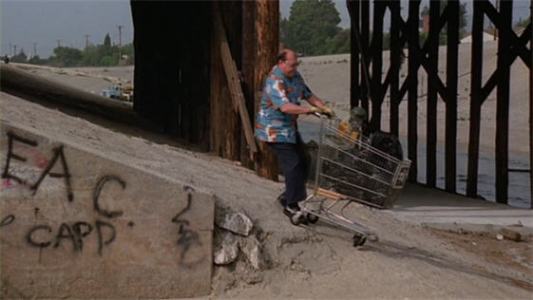 I don’t think we’re in Missouri anymore, Toto.
I don’t think we’re in Missouri anymore, Toto.
This, of course, is where the climax of Them! was shot, and it has regularly reappeared in what we might call The Right Sort Of Monster Movie ever since. The climax of It’s Alive was also set there, for one; and it occurs to me that there is a second connection between that film and Alligator, in that It’s Alive is the earliest genre movie I can think of to position Big Pharma as the enemy.
Gutchel’s disposal goes wrong this time: one dead dog fails to land in the water, the rest refuse to float away from the drop site. Lantern in hand, Gutchel climbs down to rectify the situation, only for something to emerge from the darkness…
And here, my friends, we have the reason I have so far taken the stolen-animals subplot of Alligator so calmly: rest assured that in this film, everyone you want to see DIE HORRIBLY, will in fact DIE HORRIBLY. (Granted, along with a bunch of other people, but I guess you can’t have everything…)
A leg washes up at the sewerage works – the foot, we learn, is clad in an alligator wing-tip – and the medical examiner tells Madison it’s not from the same person as the severed arm. He also notes the presence of kitty litter in the sock. Meanwhile, the owner of the arm has been identified as a sanitation worker last seen in old section of the sewerage system, “Near the drug works”. This, plus what he discovers about the direction of the company’s research into experimental hormones, leads Madison to question Helms, who puts him off verbally, but unknowingly gives himself away when he reveals that his experimental dogs – all obtained through legal sources, he insists – routinely have their vocal cords severed to keep them quiet.
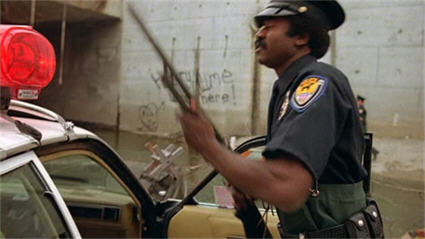

And if he’s still in the same line of work, I hope an alligator eats him.
Madison’s visit sends Helms flying to the head of the company (Dean Jagger in a deliciously nasty performance). Slade tells him not to worry about the police – “I’ll put in a fix” – but warns him against talking to any reporters.
Oddly enough, we here find ourselves in sympathy with Slade, as one such reporter, Thomas Kemp of the National Probe, uses the press conference about the apparent dismemberments to bring up the killing of David Madison’s partner five years earlier in St Louis. Chief Clark steers Madison out of the room, and the detective confesses he’s been sleeping badly recently, and dreaming about his partner’s death.
Madison calls for a volunteer to accompany him into the sewer, but his reputation as a partner-killer precedes him. Finally a young patrolman named Kelly steps up; but before they can set out they have to deal with a member of the public who comes in to confess to the killings—and then reveals an apparent bomb strapped to his chest. Fortunately, the “bomb” turns out to be a timer attached to a radio—the same radio on which the bomber heard the voices that told him to do this in the first place…
This incident creates a bond of sorts between Madison and Kelly, the latter of whom admits that he had heard, “It’s kind of unhealthy to work with you”, but adds that, “I don’t go for that locker-room crap.” Madison shakes his head over Kelly’s reckless approach to his work, but obviously feels grateful to the young man. The two venture down into the sewers, kitted out with waterproof leggings, torches and gas-masks to protect themselves from the inevitable methane pockets. Their search yields little (except for a false scare, complete with faux-dum-dum-dum-dum dum-dum-dum-dum music) until they find a lantern, still alight, demonstrating that someone has been down there not long before.
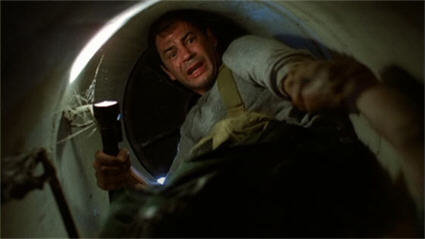
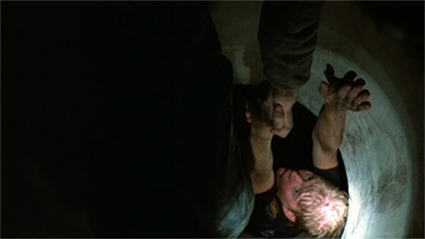
“Aww, not again!”
Agreeing that a proper search is necessary – and glad of an excuse to call it a day – Madison and Kelly stop to check their map, looking for an exit. (We get one of my favourite touches here, as by the uncertain light of a moving torch, we catch just a glimpse of something behind them.) They set out in what the think is the right direction—and almost walk straight into the gaping jaws of an enormous alligator.
The cops flee in the other direction, the huge animal stumping down the tunnels after them. They find an exit, an access chamber with a ladder to the street, and Madison climbs up—but the manhole is stuck. As he heaves desperately against the metal plate, he sees a look of terrified agony cross Kelly’s face—and a moment later, despite Madison’s desperate clutch, the young cop is dragged away…
Some time later, Madison wakes up in hospital, where he is being treated for shock. The memory of Kelly has him on his feet and into his clothes in a minute, only for his room to be invaded, first by Chief Clark, then by Thomas Kemp—who has kindly dropped in to question Madison about the rumour he’s lost another partner. Madison and Clark brush him off but a nurse is only too happy to talk, revealing that when Madison was brought in he was raving about an alligator in the sewers…
(Poor Kelly! Between the nurse mouthing off to the press and Kemp casually smoking in Madison’s hospital room, his death is only the third most horrifying thing in this sequence…)
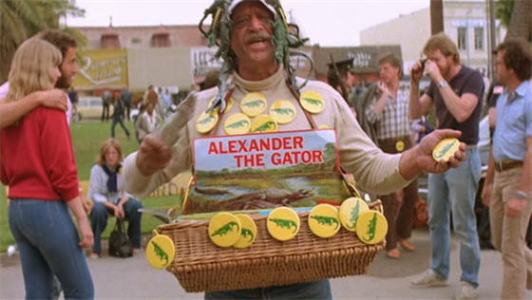 That’s not his name!…
That’s not his name!…
Clark takes Madison to consult an expert: Dr Marisa Kendall, a herpetologist who teaches at the nearby university. As she calmly milks a rattlesnake, Dr Kendall pours cold water on Madison’s story, explaining that no alligator living in a sewer could possibly be as big as Madison insists this one was, due to the lack of sunlight and the limited food; not to mention the generally toxic environment. A disgusted Madison takes himself off, but Clark stays to ask Dr Kendall whether anything else could be down there. However, she shoots down that idea, too.
On their way back, Clark tries to convince Madison to take a leave of absence, revealing that Kemp has indeed done his worst in his newspaper. Not to worry, though: having been informed that Madison was raving about alligators, Kemp decides to see for himself—and gets everything he deserves. It might fairly be said, though, that, Nothing in this life became him so well as the leaving of it, as Kemp performs a valuable community service by keeping his camera snapping the whole time he’s being munched. The recovered images are startlingly clear (Martin Brody should have been so lucky!), with the National Probe going with the most graphic of the lot for its front page.
In the wake of Kemp’s gruesome demise, Marisa Kendall is interviewed. (As the media frenzy goes into overdrive, Madison flicks his TV from channel to channel, with Alligator offering cameos from Sue Lyon and Angel Tompkins as reporters.) She now admits that the animal in the photographs is an alligator, but sticks to her guns about its possible size.
Madison is put in charge of an operation to flush the alligator out into the open, with a SWAT team and members of the National Guard under his control. He uses maps of the sewer system to figure out how they can drive the animal into one section leading to the outside, where it can be killed.
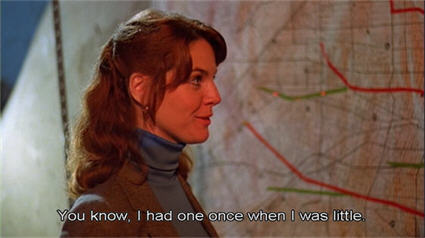
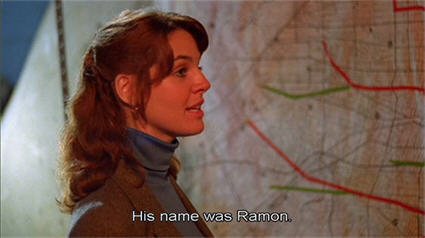
…Thank you.
As the armed men swarm around and into the sewers, with Madison coordinating from the chosen opening, Marisa turns up on Clark’s invitation. She offers Madison an apology for not believing him, which he accepts somewhat ungraciously. As the operation proceeds, Marisa tries to connect with Madison, but he’s not really listening to her; not even when she tells him about the baby alligator she once had as a pet, which sadly died while she was attending her science fair…
But in the end the operation turns out to be an embarrassing failure, with the alligator eluding the men trying to cut off its retreat; presumably via one of the unmarked tunnels noted during Madison’s search with Kelly. As the onlookers, police and media alike, turn away in disappointment or disgust, Clark hustles Madison into a car and gets him away from the scene. They have a brief encounter with a group of kids playing baseball in the street, bad-tempered on both sides, though the kids soon settle down again—or at least, they do until the footpath starts heaving under the batter’s feet…
With Ramon’s emergence from the sewers, Alligator goes into overdrive, both in terms of its body-count, and the level of sick humour. None of this, however, would work as well as it does were it not for the cleverly executed special effects, with an animatronic head supplemented by a full-body suit worked by two guys inside it (didn’t I say this was an old-fashioned monster movie??), a mechanical tail, and judicious use of real juvenile ’gators on scaled model sets; and although the fake ’gator head gave the film-makers what by this time we would regard as all the inevitable animatronic-related trouble, the results are for the most part remarkably convincing. It is only when the full-scale Ramon must at last show himself in the cold light of day that his origins are evident, and even then it isn’t jarring (perhaps because at that point he’s, ahem, rather busy). We must also commend the willingness of the cast to climb on in and allow themselves to be chomped on, with only Dean Jagger understandably excused.
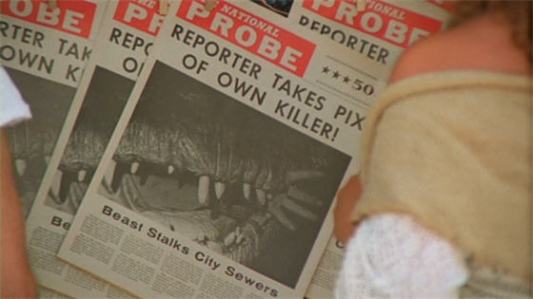
It’s what Kemp would have wanted.
The kids scatter; some of them run right into the path of an oncoming police car, which swerves and crashes; naturally, the parked vehicle it hits bursts into flames. The dazed driver sees the fire to his right and starts to wrestle with his door, which is jammed—only to then see what’s stalking down the road towards him. He makes a dive out of his open window and into the road, but he is not fast enough…
While Clark and Mayor Ledeux go ten rounds with each other, Madison and Marisa question one of the kids, who when pressed compares the alligator to an El Dorado:
Marisa: “You’re saying it was as big as a car!?”
Kid: “Yeah. Of course, you gotta add the tail…”
Footprints near the edge of a lake confirm the kid’s story; the animal is thirty to forty feet long. While Madison and Marisa contemplate this in dismay, Clark and the mayor apprise them that the business of finding and killing the alligator has been officially handed over to someone else…
As Colonel Brock, the last of the Great White Hunters – we hope – Henry Silva is hilarious here, offering sheer absurdity with a completely straight face in a performance that I can only compare to Leslie Nielsen’s in Day Of The Animals…and just in case anyone is unclear, I mean that as praise of the highest order. Trust me, people: you haven’t lived until you’ve seen – and listened to – Henry Silva flirting with Sue Lyon by imitating a horny male alligator.
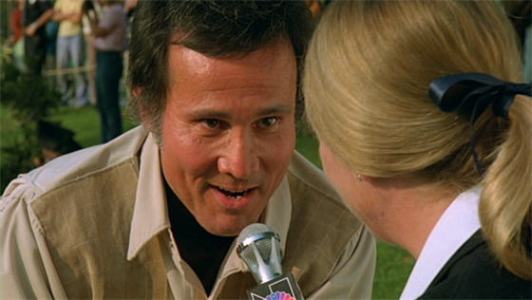
One of Nature’s most spectacular sights: Henry Silva in rut.
With Chief Clark in tow, Brock starts tracking the alligator and finds – surely for the first time in screen history! – exactly the kind of physical proof of a monster’s existence that you would, in fact, expect to find; particularly when that monster never stops eating…
Meanwhile, Madison is having surprising trouble convincing Marisa to keep working with him. Two things stand out here: one, this is one of those rare genre films where the fact that someone has ordinary responsibilities, like a job, means that they can’t just drop everything and go monster-hunting; and second, not once does Marisa so much as allude to the possibility of “saving it for science”. Ramon is not, after all, a new species, or a living dinosaur (at least not more than all alligators are); when Madison presses her, she shrugs that she’ll be there at the eventual ’gator-topsy, and that’s enough. This pragmatism is another way in which Alligator stays grounded, even when, in-film, events are spiralling out of control.
But Madison has one more card to play: tissue slides prepared during the Apso-topsy. He convinces Marisa to examine them, and she discovers evidence that the dog had been shot up with hormones, most likely a derivative of somatropin (a growth hormone). This persuades her to accompany Madison to Slade Pharmaceutical and ask a few questions. Helms is again uncooperative, evading the point in favour of lofty remarks about dealing with the world’s food shortage by making animals bigger…
(…despite the self-evidently self-defeating nature of that aim; but I won’t start on that again.)
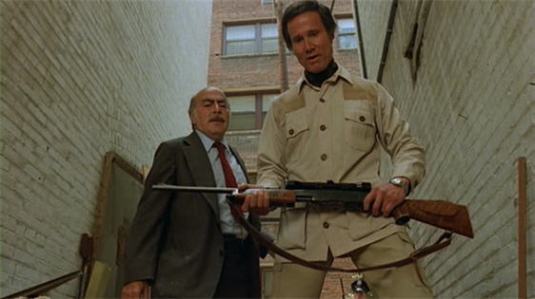
Don’t worry, I’m not going to show you what they’re looking at.
Certain that he’s on the right track, Madison is provoked into making a crack about “a hot Lhasa Apso”, which has immediate consequences. A chain of telephone calls – Helms to Slade, Slade to the mayor, the mayor to Clark – ends with Madison not merely suspended, but sacked. He goes quietly, but not without a visit to the evidence locker, where he collects the bomber’s timing device and a small bundle of dynamite…
By now Marisa is on board, and as the two venture into the sewers, they decide it’s the appropriate time for a conversation about her love-life, or the lack thereof. Marisa has already been tagged as “not normal” because she keeps snakes as pets – apart that whole baby alligator thing – and now we hear about “the president of the science club” and another guy who was “into reptiles”, and that’s about it. And while I realise it’s meant as a joke, it…doesn’t completely feel like one. Madison is, after all, every bit as dysfunctional as Marisa – if she is dysfunctional – but that’s not where the focus is.
(This sequence acts as support for my theory – my experience – that women are infinitely more tolerant of male nerdery than is true the other way around.)
Marisa and Madison are accompanied by a sanitation worker, a friend of the first victim; he finds an empty shopping cart, while Marisa finds a larder: stating her opinion that this is the alligator’s base and that, if it finds its way back into the sewer, it will return to this point.
As he looks over the preparations for his daughter’s wedding the next day, Slade puts pressure on Mayor Ledeux about the alligator, insisting on a reward being offered and posting the money himself when the mayor hesitates. It emerges that Slade Pharmaceutical has four products with the FDA and at the slightest hint of a connection between Slade and the alligator, well—
Ledeux: “And if they traced it back to the company—”
Slade: “You’d be out of a job, for one thing.”
’Nuff said. Slade then introduces Ledeux to Arthur Helms – who turns out to be his prospective son-in-law.
And then comes a moment that tends to divide audiences – some people find it reprehensible, and disengage with the film as a consequence – when some small children dressed as pirates discover that they picked the wrong swimming-pool in which to play “walk the plank”…
It’s a mean moment, that’s for sure; which is not to say that some of us aren’t jolted into a shocked laugh. Mostly, however, it’s a moment that, despite its production date, places Alligator squarely within the framework of the seventies genre film, and its take-no-prisoners attitude.
(For what it’s worth, Lewis Teague says he only meant to recall his own childhood, when he and his brother played pirates in their yard.)
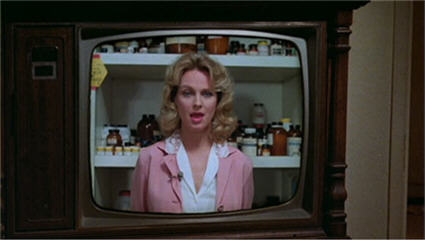
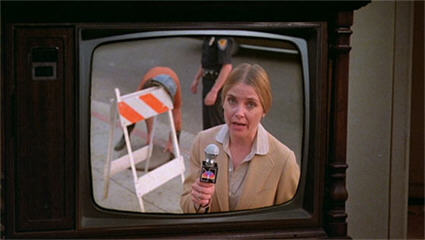
Missouri: where the news is worth watching even when there aren’t giant alligators on the rampage.
Back at Madison’s place, he and Marisa swap pleasantries:
Madison: “When I first met you, I thought you were one of those real tight-asses.”
Marisa: “When I first met you, I thought you were someone whose apartment would look just like this.”
Somehow this exchange leads to bed, and to Madison talking about his first partner’s death: how he was shot with Madison’s gun, how the “gun” at his own head was a roll of pennies, how he did freeze, just like they said…
Across town – in a moment that beats even the fate of the young pirate for sheer jaw-droppingness – the Great White Hunter is recruiting a trio of black kids to be his “native guides”, in exchange for a six-pack of brewskis and ten dollars a day each.
It’s not hard to imagine about a dozen different ways this scene could have blown up in the film-makers’ faces, but as it is they succeed in walking the tightrope, so that the joke never feels as if it’s on anyone but Brock.
With the help of his “bearers”, Brock tracks the ’gator to the not-inappropriately named “Booger Alley”, where there have been reports of “heavy breathing”. At this point the guides consider their work done and decline to accompany Brock any further, until his taunts about their masculinity provokes the trio’s self-appointed leader – “the local chieftain”, as Brock likes to call him – into following him into the alley, and thus witnessing the Great White Hunter on the receiving end of some long-overdue cosmic payback…
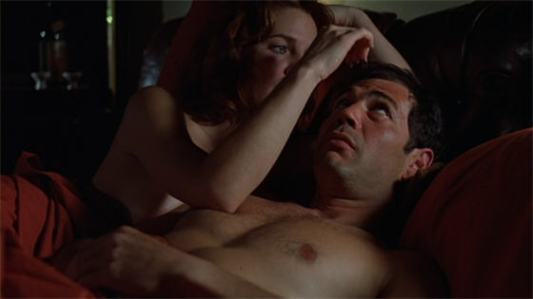
“If you don’t mind, I’d rather talk about how my partners keep dying horribly.”
A belated meal for Madison and Marisa at a diner ends abruptly when two cops break the news of Brock’s gruesome demise, and Madison reacts badly to Marisa’s expression of sympathy, driving her off with a cruel jibe about her personal life. A night of bad dreams later, and an apologetic Madison is on Marisa’s door-step—only to find himself in the clutches of her overpoweringly friendly and talkative mother, who…well, who hasn’t changed much since she took a much younger Marisa to a ’gator park in Florida, except perhaps to be…even more so.
Having kissed and made up, our ’gator-hunters break out the maps and start plotting the animal’s movements. They agree that it’s heading towards a canal and that, when it hits the lock, it will probably leave the water and go cross-country. They set out that way, but two squads of police are ahead of them; having not, apparently, stopped to consider the fundamental unwisdom of hunting a forty-foot ’gator in a fifteen-foot boat. Well—they learn. They also learn not to remove the pin from a grenade prematurely.
Marisa and Madison arrive just in time to catch the bloody aftermath, and to realise that their predictions of the ’gator’s subsequent movements were correct:
Madison: “Headed straight for the Slade mansion!”
Somehow, I just knew he would be.
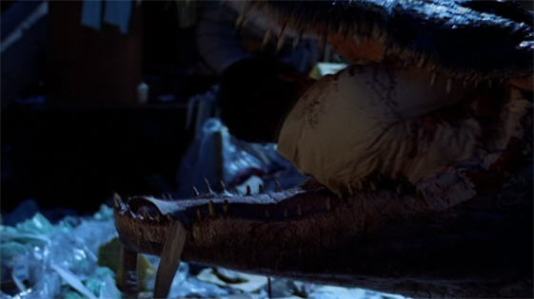
Karma, dude. Karma.
And at the Slade mansion, we find the wedding reception in full swing, attended by the city’s crème de la crème; the sycophantic Ledeux is busy annoying his host by trying to butt into his conversation. Slade is enthusiastically describing the effects of hickory on barbecue…as the smell of cooking meat drifts into the nearby bushes. A random poodle is the first to detect the uninvited party-guest, and the intelligent animal departs post-haste. As for the less intelligent animals, well…
What follows is truly glorious, as Ramon stomps and munches his way through the reception, starting with the wait-staff, chewing on a random guest or two, and then homing in on Slade and Ledeux—in the process replicating his own journey across and up the social strata of the city.
And even at this stage, Slade can find more ways to deserve his imminent demise. His security guards, abandoning the guests to their fate – not to mention the bride and groom – hustle their boss into his car, with Ledeux in hot pursuit. Slade, however, locks the doors against him…and then cowers back as Ramon catches up with the mayor, snatching him up in his jaws and slamming him repeatedly against the windows of the car until he’s reduced to a bloody pulp.
“Get going, you fool!” shrieks Slade at his chauffeur, but it’s too late. Having spat out Ledeux, Ramon turns back to the car, using his tail to smash it – and Slade – into oblivion…
(The bride is spared, by the way; Arthur Helms, not so much.)

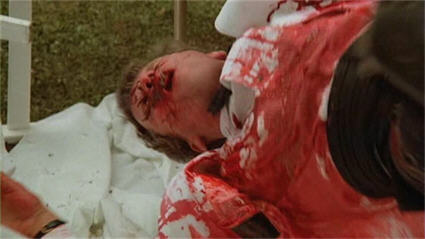
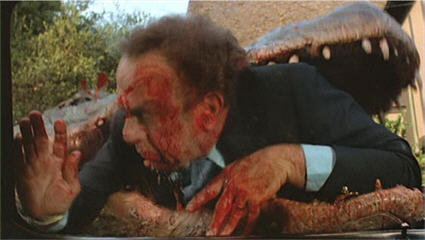
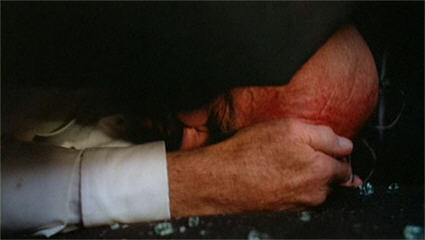
It’s okay, everyone, the poodle gets away!
Madison and Marisa turn up just too late as usual, and after an argument at the front gate with an oblivious name-checker (Mike Mazurki!) about their lack of an invitation, and after gawking in understandable disbelief at the remains of the reception, they find someone to point them in the right direction. The follow the ’gator’s trail out of the grounds and into the surrounding country—where they find a storm drain and an opening into the sewers.
The two then split up, with Madison venturing back underground to the ’gator’s larder, planning on drawing it to where he can both plant the bomb and escape, and Marisa heading for streets above, to make sure that this manhole isn’t blocked…if she can…
Alligator is enormous fun—fun with a sharp edge, I grant you, but fun just the same. John Sayles, with Piranha behind him and The Howling yet to come, is fully in control of his material, playing the old urban myth about alligators in the sewers for all that it’s worth. Lewis Teague’s direction is assured, and gets the tone of the film exactly right; while the cast is made up of the sort of “real people” actors that we so rarely find in this sort of thing anymore, but which contributes so much to the selling of an outrageous idea. Though I am given to saying, “Don’t you miss the seventies?” more in irony than with nostalgia, in that respect I do indeed miss them. The central cast is surrounded by a wonderful collection of character actors, while for a quickly shot, evidently low-budget production, there’s a remarkable amount of detail in the production design (keep your eye on the walls in this film, people, graffiti and posters alike), which is in turn enhanced by the location shooting – much of it done in the L. A. storm-drain system.
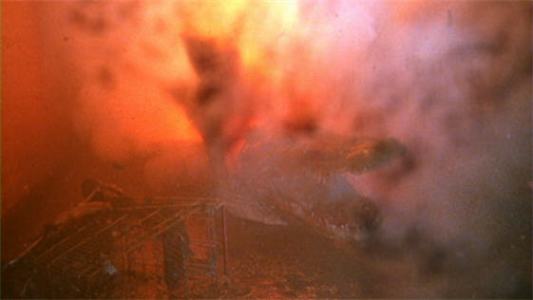
Alligator mississipppiensis inflammabilis.
The other thing that struck me on this viewing is that Alligator gets something right that really shouldn’t be that hard, but which many such productions get stupidly wrong: namely, it provides a reasonable explanation for unreasonable events. Honestly, no-one is more willing than I am to play along with a film of this sort, but you have to give me something to work with; some hint you’ve put a little bit of thought into it. Here, the script is studded with allusions to Ramon’s lifelong diet of experimental hormones, in who-knows-what amounts and combinations, and to a certain synthetic testosterone that “tends to hyper-excite the organism’s metabolic rate” and induces “an insatiable appetite”. Voila! – a little mad science down the sewer-system, and everything’s sufficiently explained. My hackles are laid, and I prove that I can review a killer animal film without ranting about how animals don’t just keep eating, and how they certainly never spit out one victim purely in order to eat another one…
And okay, maybe the mayor-slamming and the car-crushing are a leetle much; but I think the makers of Alligator earned them.
Heck…they even earned the Gratuitous Kicker Ending…
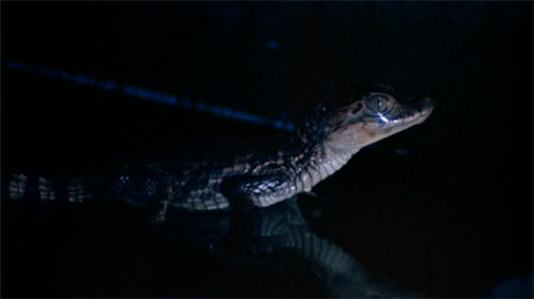
So, to recap: SQUEE!!!!
***********************************************************************

This review was part of the B-Masters’ Pets Gone Wild Roundtable.

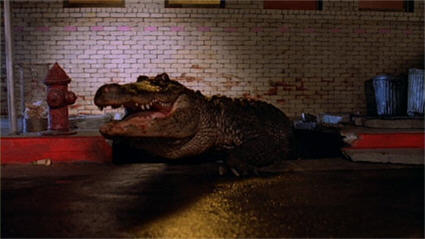
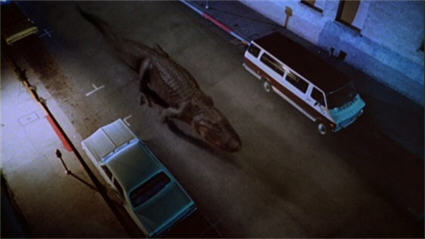
so glad you added my favorite quote – “of course, you have to add the tail”.
the new format looks great. I love your new border – “it’s test tubes, it must be SCIENCE” (and they’re even bubbling)
hope you have better luck with this iteration.
LikeLike
Hi, Dawn – thank you so much for dropping in, and I really appreciate your feedback.
Great to hear you’re a fan of Alligator too – no end of quotable quotes there! 😀
LikeLike
Pingback: Uninvited (1988) | and you call yourself a scientist!?
Yay, commentability! I keep wanting to rind a way to get Cape Jeer to have that — not that it would get much use anyway.
LikeLike
Hi, thanks for visiting (and commenting)!
One of the many, many things I am looking forward to re: unemployment is having time for proper site visiting again, another hobby that’s fallen off the radar… 😦
LikeLike
Well you certainly shouldn’t feel any obligation to read Cape Jeer; I can’t imagine you’d have much interest in superhero movies, especially now that they’ve become so mainstream. (Though I do have Rat Pfink A Boo Boo up there now.)
LikeLike
The new layout is wonderful. Keep up the great work, Lyz.
LikeLike
Thank you, much appreciated!
LikeLike
I love everything about the new layout! It’s clean, logical and easy on the eyes.
I’ve always loved the way you write and read many of the reviews more than once….looking forward to revisiting them as they get posted on the new site. Belated happy new year to you.
LikeLike
Thank you very much, Jane!
LikeLike
(Though I do have Rat Pfink A Boo Boo up there now.)
Rat Pfink A Boo Boo!? I’m THERE!! 😀
LikeLike
Your own comment section? You thought you had to read my words a lot before…now you’ll never be rid of me, Tod — er, Lizzy (Lyzzy?)
I seem to be the odd man out; I rather enjoy the synopsis block you start with. It’s a good warm-up to the main event, and it kind of flows nicely without breaks and paragraphs and what-have-you. I think the style helps set it apart from the review proper.
Apropos of nothing, the handle “lyzmadness” made me laugh as it reminded me of something you posted on the B-Masters site once. Because my brain stores only the finest, most useless nonsense, waiting to spit it forth and make everyone wonder what the hell is wrong with me (as you can attest to).
LikeLike
So I’m Henry Daniell to your Boris Karloff?
I can live with that.
Thanks for the input. Like I say, I find the synopsis a helpful exercise – and no-one’s obliged to read it – and yet I get all these agitated emails asking why I do it, or telling me to do it differently, or not to do it at all— Second in comment popularity only to “Do you know you have dead links?” 😀
(No, I’m not going to ask what I said…)
LikeLike
I’m Boris Karloff?
I can definitely live with that.
Although I like the style (It’s like an unrelenting build-up to a dramatic moment in the movie, then ellipses…and now I must know more! I must read on!), I could see why people might not. Not wanting it at all, though, I must admit mystifies me. You’re unique with your teasers pre-review, and I like getting an idea of what to expect with movies I’m not familiar with. For what it’s worth, you’ve got one in the “yea” column.
It was nothing bad it reminded me of; just a silly joke you made. It stuck out because you’re generally so erudite. And no, that is not a joke.
LikeLike
Hi, Lyz, the new layout looks great, the magic is still here, in any format! And, as always, your reviews are the best!
LikeLike
Aw, thanks, José! 🙂
LikeLike
A creature feature written by John Sayles from 1980? I’m in.
LikeLike
You should be! – it’s a great little film. 🙂
LikeLike
I caught this movie way back when I was a teenager and had a serious case of insomnia (as in I went to a university sleep disorders clinic and spent nights with electrodes on my head as part of the search for sleep) and was seeing a lot of the sorts of movies that used to show up after midnight, along with reruns of Hawaii 5-0 and the like. I recall liking it but my memory was pretty vague about the specifics. It certainly sounds worth searching out.
Since this review will attract the attention of people who appreciate the crocodilian family I’m just going to throw this question about a TV show out there in case someone can enlighten me: Several years ago I came across a documentary, about an hour in length I think about the estuarine crocodiles in Australia and have never been able to remember what the name of the program or it’s host was – and no, it wasn’t Steve Irwin! I recall the host being a stocky, bearded man. Anyone out there have any ideas?
LikeLike
We get so many wildlife documentaries—the presenter was definitely Australian?
ETA: You don’t by any chance mean Rob Bredl, do you? That would be ironic: he was attacked by a crocodile a couple of months ago (he’s okay).
LikeLike
I clicked on the link and yep, that’s the guy who hosted the documentary I saw! I recall him getting pretty up close and personal with the crocodiles so I’m not entirely surprised that he got bit. Glad to hear he’s OK. One of the things he seemed to be trying to convey in the documentary was how unlikely it was for the average person to be endangered by a crocodile if they followed a few fairly simple guidelines such as not going down to the water’s edge and splashing around while washing up. He seemed to be trying to make people respect but not fear crocodiles. That does make it a little ironic that he got attacked though. I used to do a lot of backpacking here in British Columbia and we always took a few precautions to avoid bears (bell hanging from the backpack so we made enough noise that we couldn’t unintentionally sneak up on a bear, hang all the food on a line between two trees a good distance from the camp etc.). Bobcats, coyotes and wolves frequented many of the areas we hiked in too but the chances of any of them attacking a group of hikers is extremely remote. The times I was fortunate enough to hear a pack of wolves howling up a storm I really enjoyed the concert actually.
LikeLike
Well, he’s not really the average person—he deals with crocodiles on a daily basis which shifts the odds significantly!
We get more people attacked by crocodiles than sharks here, though you wouldn’t know it from the media coverage (lots of unpleasant implications there which I won’t get into). Some of it is tourists where they shouldn’t be or behaving as they shouldn’t, but in most cases it’s just the inevitable collision as both populations spread.
LikeLike
Now that I found out who the guy was I’ve been able to watch some more of the things he’s done that are available online. I rather liked a lot of it. He seems to really love the animals he talks about. That’s nice to see when there are so many “nature shows” on television here in North America that seem to do their best to hype the “danger” of everything, especially the larger predators for forced dramatic effect. This site is a treasure trove where I keep finding unexpected little delights.
LikeLike
Aw, thank you.
To those different attitudes you can add whether a show is really about the animals, or about the presenter.
LikeLike
That obvious affection for animals is why I love watching Sir David Attenborough. Well, that and his incredibly smooth voice. But his blatant delight with every critter he encounters makes me happy just to think about.
I may have to check this Rob guy out.
LikeLike
I’m sure you probably already know this, but the “baby alligators” that idiots used to sell (and buy) were in fact typically baby caimans, so the movie is actually pretty accurate on that point!
LikeLike
Pingback: Blackmoor Vituperative"Alligator" (1980) » Blackmoor Vituperative